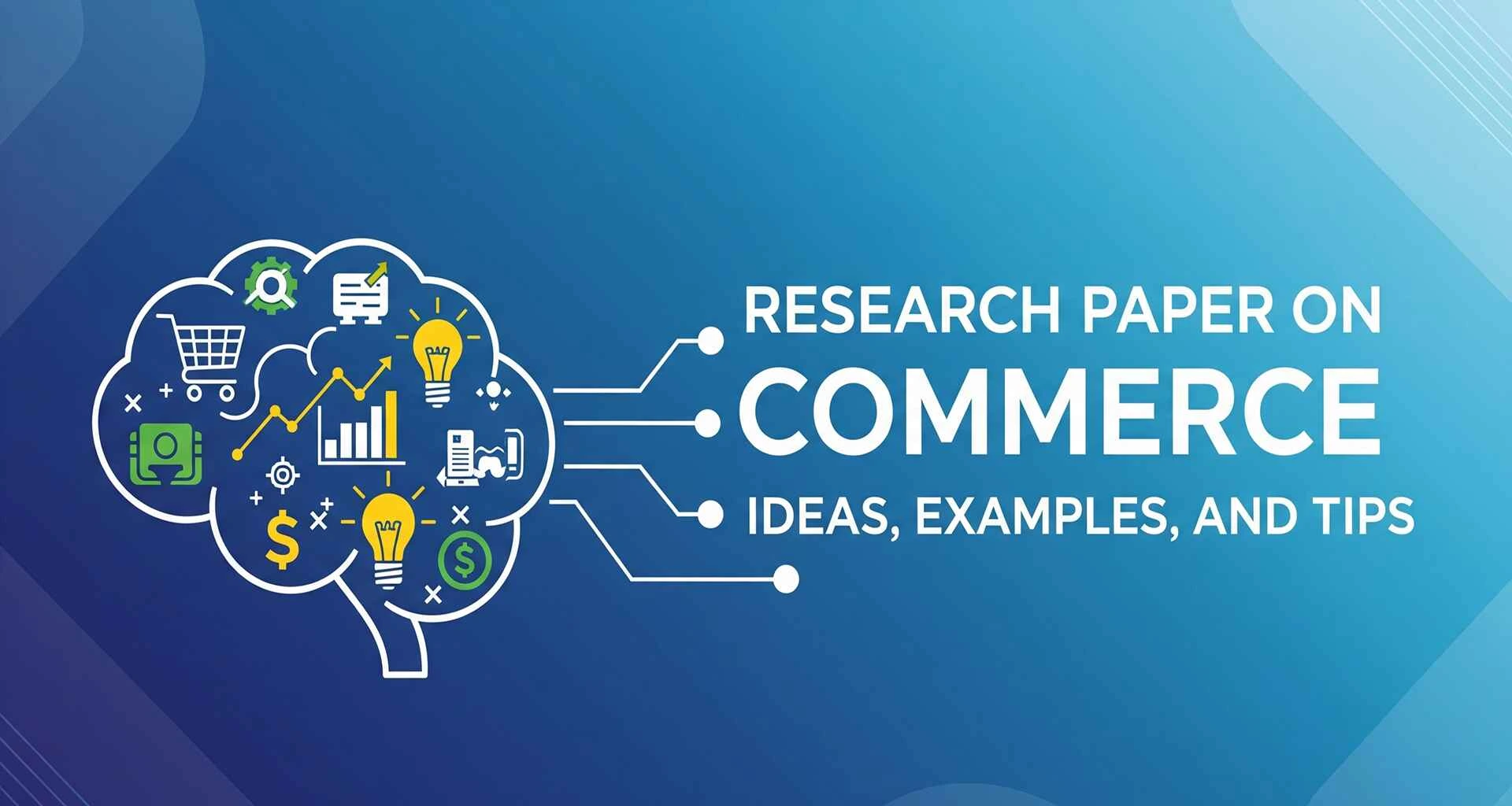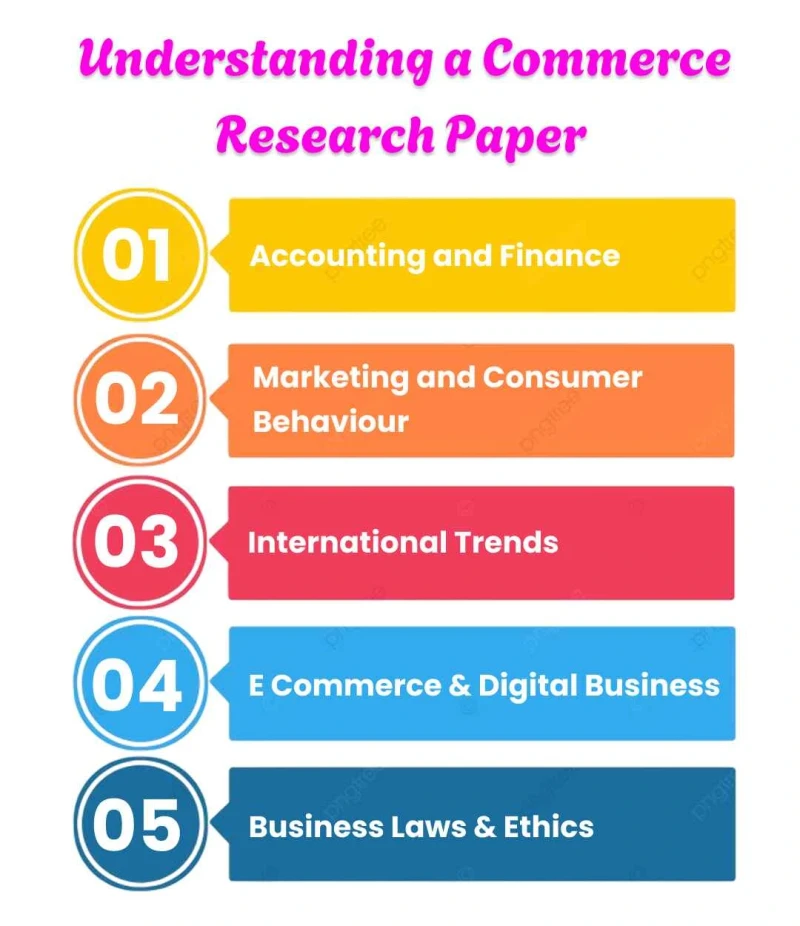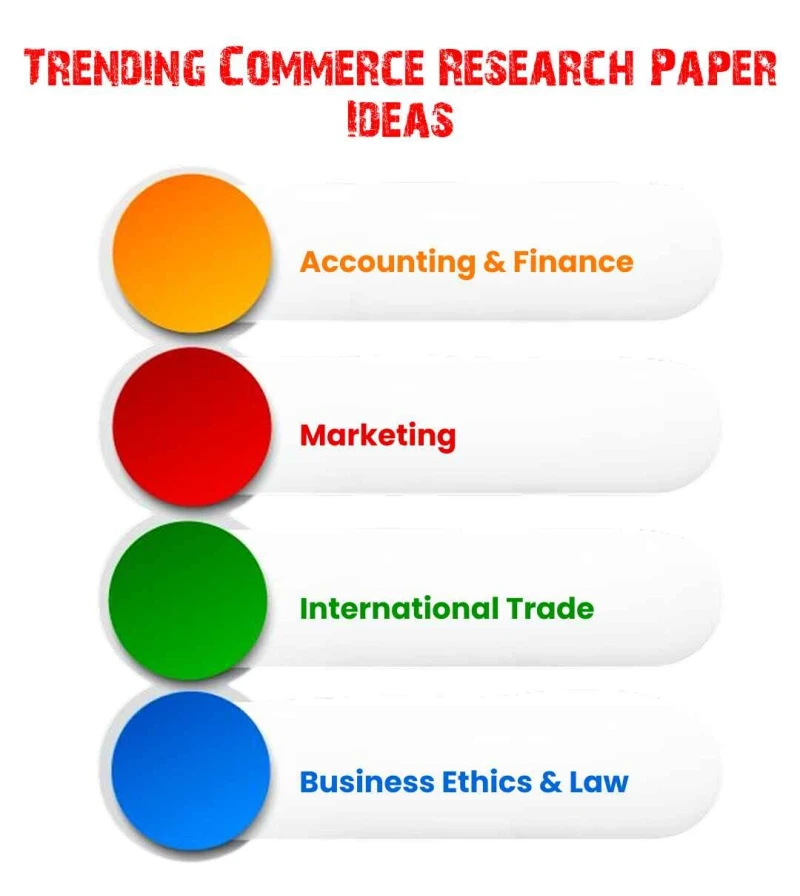Methods of Primary Data Collection in Research Methodology
Master the top methods of primary data collection in research methodology. Learn to use surveys, interviews, and experiments to gather original, high-quality data.

Esther. F
Commerce is an academic discipline which explores the intricate dynamics of trade, business, finance and economics. It equips students with a deeper understanding of how markets function, how businesses operate and how financial decisions impact society.
Conducting research in commerce is highly significant; it enhances the students' analytical and problem-solving skills. It also provides valuable insights for businesses and policymakers aiming to make informed decisions in an increasingly competitive economic environment. More than this, the ultimate challenge begins with writing a research paper on commerce.
However, most of the students face challenges when selecting topics, defining research objectives, and structuring their papers. Choosing a topic that is relevant and researchable can be daunting, and maintaining clarity and logical flow throughout the paper requires careful planning.
This blog aims to address challenges by offering practical ideas, real-life examples, and actionable tips to guide students through the process of crafting a high-quality research paper in commerce.

A commerce research paper is more than just an academic requirement; it is a way for students to dive into the real-world business challenges and gain practical insights. By exploring topics in business, trade or finance, students not only sharpen their analytical skills but also contribute knowledge that can influence how companies operate and how policies are shaped.
Commerce research covers several key areas, each offering exciting opportunities to investigate and learn:
Understanding financial statements, investment trends, taxation and risk management strategies.
Studying what drives customer choices, brand perception, advertising impact and market trends.
Looking at global trade patterns, import-export policies and economic relations between countries.
Exploring online marketplaces, digital marketing, and emerging business technologies.
Learning about corporate governance, legal compliance, and ethical decision-making in business.
Studying commerce research allows students to appreciate how data-driven evidence informs actual business decisions. Sound studies can inform organisations how to anticipate market directions, enhance performance, and make evidence-based, responsible decisions.

Selecting the right topic is often the first challenge students face when writing a commerce research paper. To make this easier, we have categorised trending ideas across key domains, with 20 numbered topics in each area.
The effect of IFRS implementation on corporate financial reporting
Financial risk management in small and medium-sized enterprises
Assessment of the efficiency of tax incentives for start-ups
The contribution of audit quality to investor choice
Corporate budgeting techniques and their impact on profitability
Investment strategy analysis in emerging markets
Financial literacy in university students and its impact on expenditure behaviour
The influence of working capital management on firm performance
Forensic accounting as a deterrent to corporate fraud
Digital banking effects on conventional financial institutions
Capital structure decisions in global corporations
Sustainability reporting and its effects on investor perception
Cost management techniques in the manufacturing sector
The application of artificial intelligence in financial planning
Internal controls and their impact on operational efficiency
Effects of mergers and acquisitions on shareholder value
Cryptocurrency adoption and financial risk evaluation
Asset management practices in government-owned companies
The influence of financial regulations on small enterprises
Performance evaluation of banking institutions during economic crises
Consumer behaviour change during the pandemic
Brand interaction and social media advertising
Measuring influencer marketing effectiveness on Gen Z buying behaviour
Cross-cultural variation in consumer sentiment
Digital marketing for small businesses
Long-term loyalty programs and customer retention
Effectiveness of personalised marketing on online retail sales
Brand positioning in competitive markets
The use of marketing analytics in decision-making
The emergence of mobile marketing and its effectiveness permalink
E-commerce promotion tactics and consumer reaction
Content marketing trends in the digital age
Ethics in marketing to children
Consumer preference is influenced by sustainability messages
Social commerce and word-of-mouth recommendations
Effect of consumer price strategies on purchasing habits
Brand image is influenced by packaging design
Influence of virtual reality on experiential marketing encounters
Measuring customer satisfaction and business success
Emotional connection with consumers through brand storytelling
Consequences of trade wars on emerging economies
Role of free trade agreements in economic development
Brexit implications on trade policies in Europe
Supply chain disruptions globally and their economic impacts
Exchange rate volatility and export competitiveness
Trends in foreign direct investment in developing countries
Analysis of import-export policy reforms
Cross-border e-commerce and global trade regulations
Multinational corporations' role in the formulation of trade policies
Compliance difficulties facing small businesses in trade
Regional trade blocs' economic impacts
International tax planning strategies for multinational companies
Export finance and SME development
Globalisation and its effects on local industries
Tariff levies and their consequences on volumes of trade
Logistics across the globe and supply chain efficiency
Comparative analysis of trade policies in developed versus developing nations
Technology as a driver in simplifying trade internationally
Barriers to trade and their implications for SMEs
Assessment of bilateral trade arrangements on economic performance
Corporate governance and its effect on firm performance
Ethical decision-making in multinational business firms
Role of CSR in creating corporate reputation
Compliance with labour law in small and large organisations
Environmental ethics and green business practices
Enforcement of intellectual property rights in the digital age
Ethical marketing practices by e-commerce businesses
Anti-corruption practices in public and private sectors
Workplace ethics and job satisfaction
Transparency and accountability in corporate reporting
Legal problems in cross-border e-commerce
Competition law and market fairness
Socially responsible funds' ethical investment policy
Corporate culture and whistleblowing policy
Ethical leadership and organisational performance
Consumer protection law of online transactions
Corporate social responsibility for emerging markets
Effect of regulatory frameworks on business processes
Professional development and business ethics education
Ethical marketing and advertising campaign issue
Adoption of Artificial Intelligence in E-Commerce Platforms
Role of Augmented Reality in Enhancing Online Shopping Experiences
Cybersecurity Challenges in E-Commerce Websites
The Future of Mobile Commerce: Trends and Innovations
Sustainability Practices in E-Commerce Logistics
Personalisation and Recommendation Systems in Online Retail
Impact of Chatbots on Customer Experience in E-Commerce
E-Commerce Fraud Detection Using Machine Learning
Omnichannel Strategies in Online and Offline Retail Integration
Customer Loyalty Programs and Retention in E-Commerce
Influence of Social Media on E-Commerce Consumer Behaviour
Payment Gateway Innovations and Their Impact on Online Sales
The Role of Big Data Analytics in E-Commerce Decision Making
Cross-Border E-Commerce and International Shipping Challenges
Effectiveness of Digital Marketing Campaigns in E-Commerce Growth
Voice Commerce: The Future of Shopping via Smart Devices
E-Commerce Pricing Strategies and Consumer Perception
Ethical Practices and Transparency in Online Marketplaces
Subscription-Based E-Commerce Models and Customer Engagement
Impact of User-Generated Content on Online Shopping Behaviour
Exploring trending topics across disciplines helps researchers produce relevant and impactful studies. A commerce research paper on accounting & finance examines financial management and digital transactions, while a commerce research paper on marketing focuses on consumer behaviour and brand engagement.
Scholars can explore global business with a commerce research paper on International Trade, study innovations in online retail with a commerce research paper on E-Commerce, or address ethics and compliance through a commerce research paper on Business Ethics & Law. Choosing these trending topics ensures academically rigorous, practical, and influential research in commerce.
Referring to real-life case studies strengthens a commerce research paper and makes it more readable.
For instance, a report on the effects of demonetisation among small enterprises in India demonstrated how government decisions influence daily trade and jobs. A discussion of global case studies, such as the rise of e-commerce platforms during the pandemic or the role of corporate governance in shaping investor trust.
Amazon's sustainable e-commerce model demonstrates how digital technology and environmental practices can create the future of online enterprise.
Globally, studies on corporate governance and shareholder value have opened up issues of transparency, accountability, and financial expansion.
Employing such examples serves to close the gap between practice and theory. Employing notions based on company reports, governmental publications, and industry research not only makes your paper credible but also indicates how commerce research is utilised in practical life.
Writing a commerce research paper becomes much easier when you break it into clear steps.
Step 1: Choose a research topic that is relevant and researchable.
Step 2: Read existing literature, case studies, and credible data sources.
Step 3: Construct an explicit research question or hypothesis to direct your study.
Step 4: Collect data, which can involve surveys, company reports, or financial reports.
Step 5: Use qualitative or quantitative tools like SPSS, Excel, or regression models to analyse your findings.
Step 6: Organise your paper into the common sections: Abstract, Introduction, Methodology, Results, Discussion, and Conclusion.
Step 7: Lastly, proofread well, cite sources in APA/MLA format, and scan for plagiarism.
With these steps, your research paper will be well planned, authentic, and effective. For ideas, visit these topics for research.
Scoring well in a commerce research paper isn’t just about finishing it; it’s about how clearly and effectively you present your ideas. Start by picking a topic that feels fresh and closely tied to today’s business issues.
Back up your points with recent data, case studies, or statistics so your arguments carry weight. Keep your paper running smoothly from one section to the next, making it simple for readers to follow your train of thought. For analysis, software such as SPSS or Excel will assist in presenting findings accurately.
Don't neglect proper citations; applying APA or MLA styles appropriately displays academic integrity. Most importantly, seek simplicity. Write in clear, uncomplicated language rather than dense jargon. A paper that’s easy to understand, well-supported, and structured logically will always stand out.
Even strong students can make errors when working on commerce research papers. Some of the most common pitfalls include:
Choosing an unfocused topic, either too broad to manage or too narrow to expand meaningfully.
Relying only on textbook theories without using real-world data, surveys, or case studies.
Poor citation practices, such as missing references or incorrect formatting.
Lack of structured flow makes the paper difficult for readers or evaluators to follow.
Ignoring recent business trends can make research appear outdated and less valuable.
Avoiding these mistakes will make your paper stronger, clearer, and more impactful. For a deeper look into why submissions often fail, explore this guide on the rejection of your paper.
With the ever-increasing pace of the academic and professional world today, top-notch research and neatly organised writing are essential ingredients for credibility and impact. Whether you are writing your thesis, dissertation, or an advanced research project, dedicating time to careful planning, precise methodologies, and proper analysis lays the groundwork for success. Additionally, basing it on credible sources, communicating ideas with clarity, and staying original to make you stand out in your academic career.
Simultaneously, professional PhD guidance can be a game-changer, particularly when dealing with intricate issues, style guidelines, or publishing demands. When you're stuck on finalising your research, refining your writing, or adhering to deadlines, keep in mind that professional guidance is always accessible.
Move closer to academic success today, reach out to our team for customised research and writing help crafted to suit your objectives.
Master the top methods of primary data collection in research methodology. Learn to use surveys, interviews, and experiments to gather original, high-quality data.
Don’t write your methodology without reading this. Learn why purposive sampling is essential for case studies and how to define your inclusion criteria. Url:purposive-sampling
Master the chapterization of thesis to ensure logical flow. Learn the standard academic framework for organizing research into a professional, approved document.
A practical guide to sentiment analysis research papers covering methodologies, datasets, evaluation metrics, research gaps, and publication strategies.
Master data analysis for research papers. Learn quantitative and qualitative methods, cleaning, and reporting standards to ensure your study meets journal rigour.
Want to impress your peers? Discover the best ways to condense your research, avoid common mistakes, and handle tough questions at any academic conference.